Nina Lorez Collins and Stephanie Staal Ask Each Other Often: ‘What Am I Doing with My Life?’
July 05, 2018 | Filed in: Woman of the Week
Nina Lorez Collins and Stephanie Staal met for the first time almost 25 years ago, when Nina interviewed (and then hired) Stephanie for a job. In the decades since, they’ve supported each other through multiple career changes, marriages, kids, and additional joint ventures—the latest of which you may be familiar with: The Woolfer, a website and newsletter for literary-minded women over 40. Originally a secret Facebook group for women of a certain age, called “What Would Virginia Woolf Do?” (a darkly humorous nod to the fact that the famous writer did not, unfortunately, live to confront the challenges of aging), the collective has evolved into a full-blown content platform and inspired a new book by Collins, What Would Virginia Woolf Do? And Other Questions I Ask Myself as I Attempt to Age Without Apology. Here, we spoke to Nina and Stephanie about the ebbs and flows in their personal and professional lives, why stability is overrated, and the question, “What am I doing with my life?”
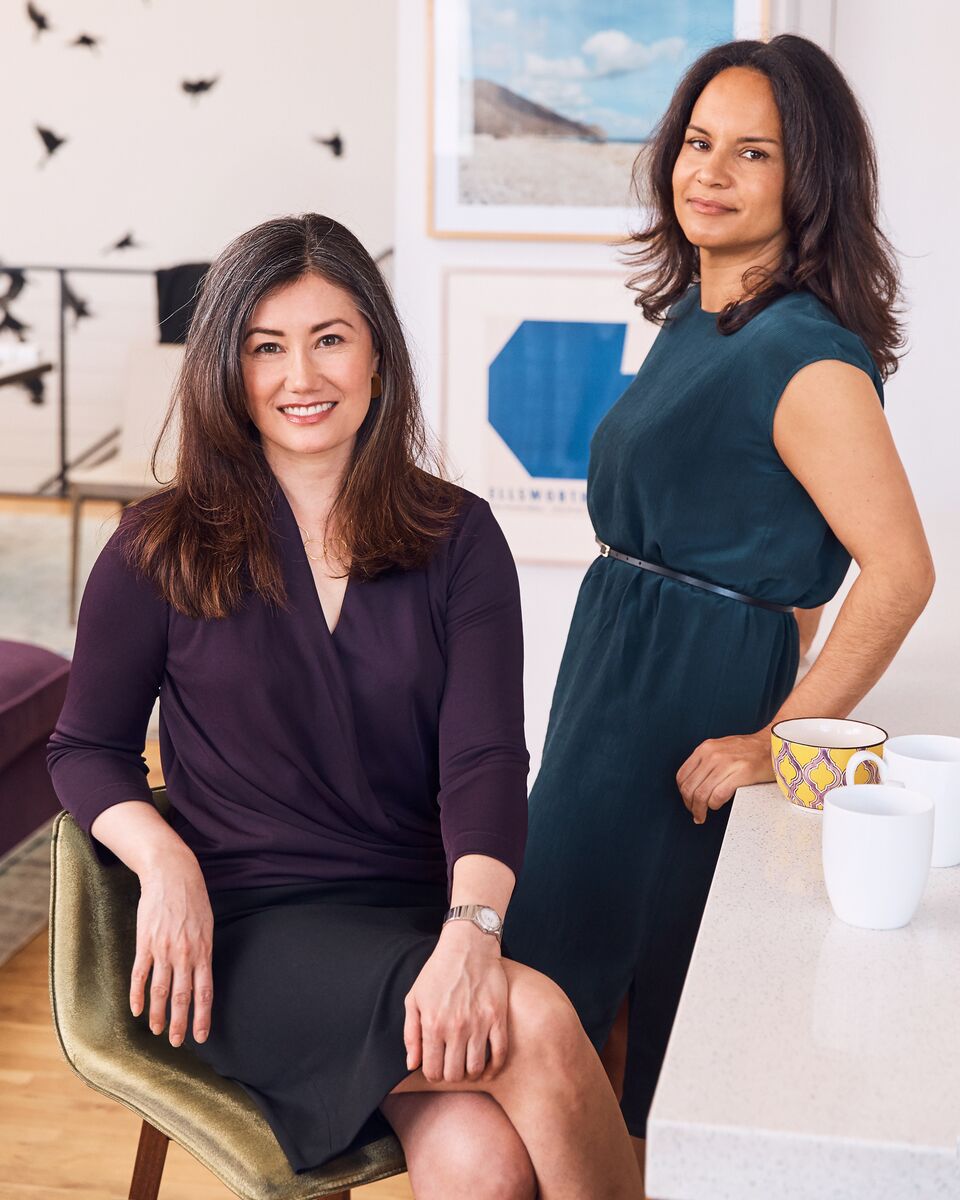
Stephanie (left) wears the Deneuve top in blackberry, the Greenpoint skirt in black, and the Helene necklace. Nina (right) wears the Doris dress in rainforest.
On Friendship
Nina: I was eight months pregnant with my first child when I interviewed Stephanie for a job. She was 22, and I was looking for an assistant for a scouting company that I had founded. The company was just the two of us at first, working alone together in my apartment. Over the next six years, we grew it into a successful venture with five employees. Our job was to know everything that was happening in publishing, and help our clients buy the rights to books. For example, we’d help our German clients buy the translation rights to bestsellers like Memoirs of a Geisha or Cold Mountain, or one of our L.A. film clients buy the movie rights. It was super glamorous and fun, because we were all in our twenties and traveling around to book fairs and to Europe. And then Stephanie left to go to graduate school for journalism.
Stephanie: Both of our careers have had many iterations. Nina is two or three years older than I am, which I was shocked to discover when I met her, because I was expecting someone much older. We hit it off right away. It was definitely a mentor/mentee relationship at first.
Nina: I think we probably wouldn’t have become friends if we hadn’t worked together. We were in such different places when we met. I was married and pregnant, and she had just graduated from Barnard. The dynamic of our relationship still feels a little bit like I’m her big sister.
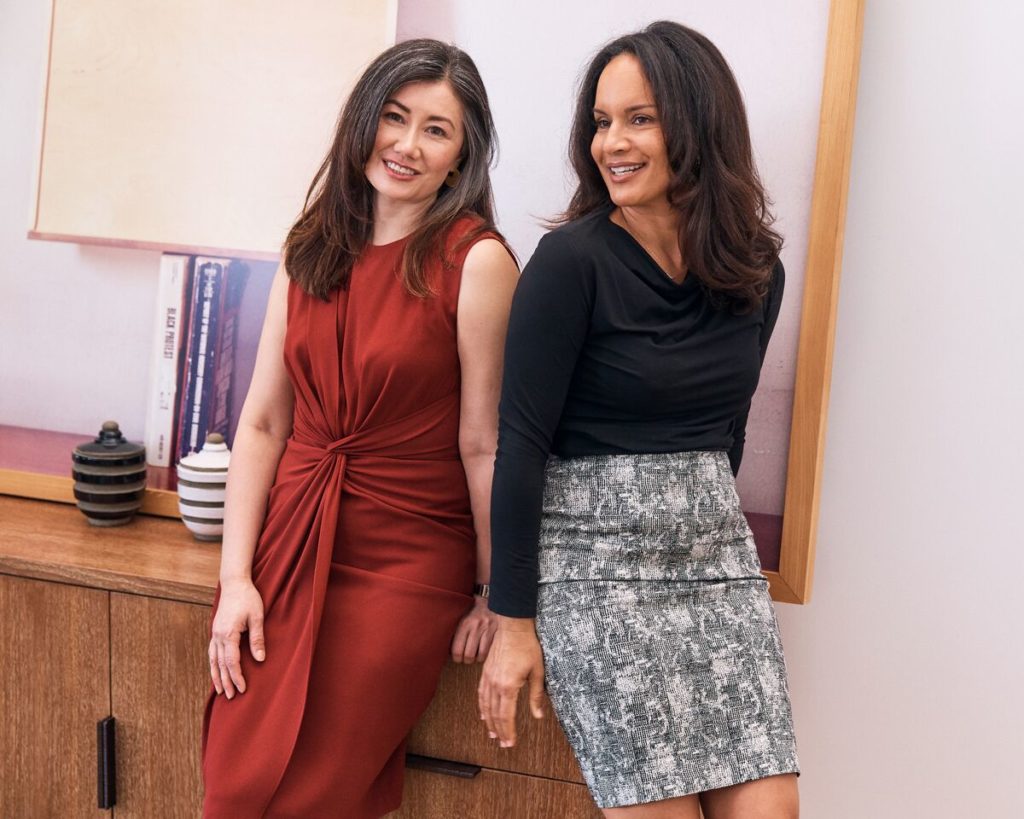
Stephanie (left) wears the Taylor dress in pomegranate. Nina (right) wears the Winfrey top in black and the Noho skirt in crackle.
On Second Acts… and Third, and Fourth Ones
Stephanie: I went to graduate school for journalism at Columbia, and while I was there I wrote a thesis that turned into a proposal for my first book, The Love They Lost, about children of divorced parents. I sold it after I graduated and then I worked on the book for about a year. By then, I was pregnant with my first child, and we moved down to Annapolis for four years. When I started my second book, Reading Women, Nina became my agent, so we worked together again.
Nina: When Stephanie left for graduate school, I hired someone to replace her, but it was never the same for me. About a year and a half later, I decided to shut down the business entirely. I was only 28 or 29, and the company had been quite successful, and I thought, “If I don’t stop now, I’ll just be doing this forever, and there are other things that I want to do too.” So I told everyone to go get new jobs, and then I took a couple of years off and had my fourth kid and started a literary agency in 2002.
Stephanie: In our twenties, there wasn’t much of a boundary between our private and professional lives, especially in our industry, because so much of our job was socializing. That was incredibly fun, but it also meant you were always working. In my thirties, I learned how to do “me.” Having a kid was big. So was moving away from New York, which in retrospect was a mistake. I was doing freelance writing and editing, so I figured I could do that anywhere, and it made sense financially to move. But I really missed New York. When we came back, it was wonderful, and I reconnected with the work I wanted to do. As my daughter was getting older, I wanted more stability, and to feel like I was building something. So I made the crazy decision to go to law school. I went to Brooklyn Law School part-time, while I was still freelancing. I saw my law degree as just expanding my options. Now, I practice as an appellate court attorney, which involves a lot of research and writing. It’s almost like an extension of law school, which I loved.
Nina: When I was about 37, I got divorced from the father of my four kids and decided to close the literary agency soon thereafter, around 2008. I was pretty depressed and sick of publishing, and I wanted to do something else but didn’t know what. I took five years off. I started researching a memoir about my mom’s life and writing about divorce. I had always toyed with going to graduate school for psychology, and instead I got a master’s degree in narrative medicine at Columbia. I worked for two years at a hospital in Brooklyn, developing a curriculum for medical residents working in palliative care. I was interested in stories around loss and transition and grief. Then, in October 2015, I started the Virginia Woolf project as a secret Facebook group, just for fun. By January, there were over 600 women in it. People would come up to me at cocktail parties and whisper in my ear, “I’m in the group.” A lot of women struggle with reinvention, but for me, this project has been weirdly organic, bringing together all of my interests and skills.
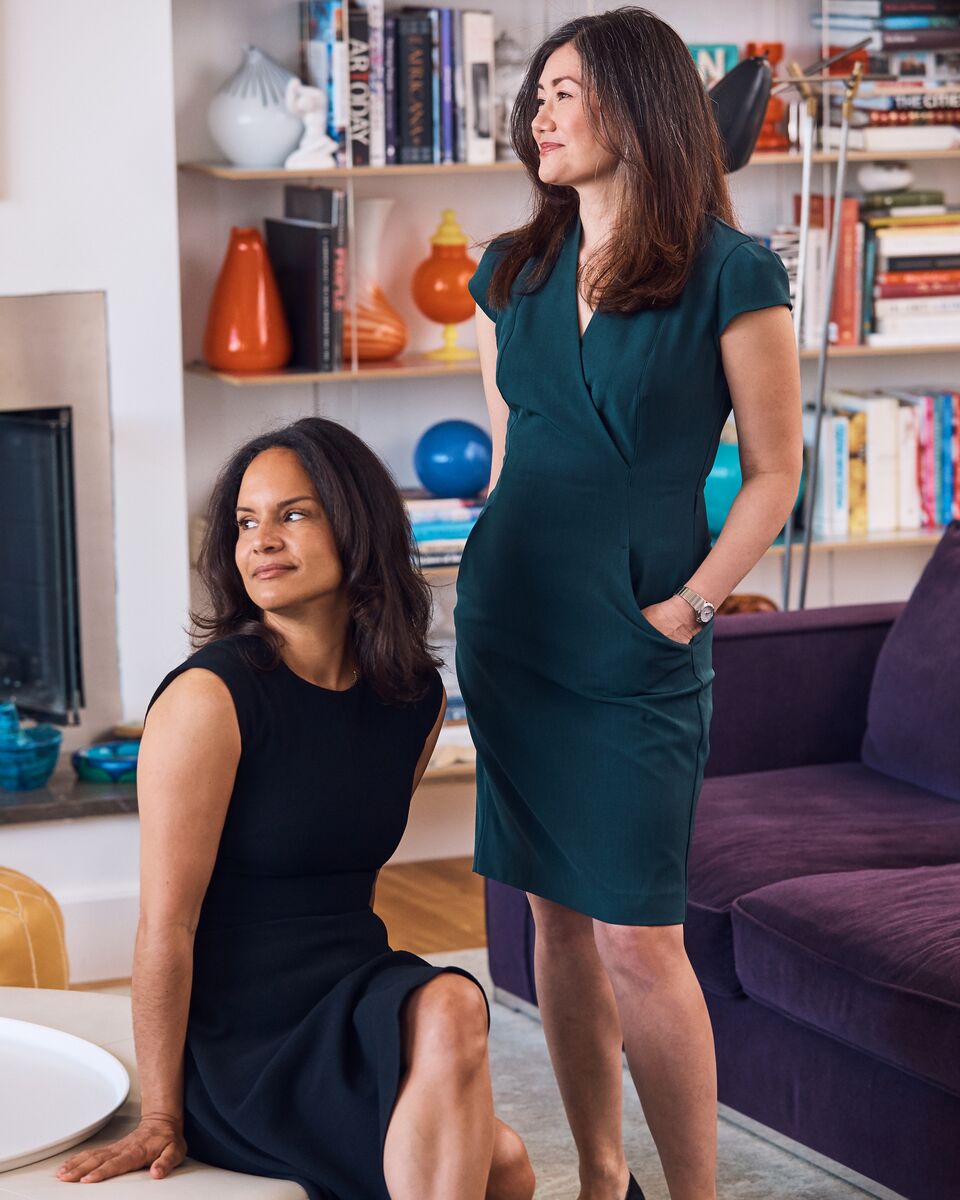
Nina (left) wears the Toi staccato dress in black. Stephanie (right) wears the Felisa dress in rainforest.
On Rough Transitions
Nina: Stephanie and I have had many conversations where we’re like, “Oh my God, what am I doing with my life?” We are both divorced, and we’ve talked a lot about that: “Would it have been better for my children if I had just stayed with their father?” Maybe, I don’t know. One of my hardest self-reflective moments came when I was writing my book, and had to write a chapter about the story of my career, which required that I come to terms with it. Do I regret that I shut down those businesses? Ultimately, yes. It would be nice, now, to have a 30-year career that I had built and stuck with. But then I wouldn’t have published this book or started this group or had these other experiences.
Stephanie: At times, I’ve felt like a cruise ship trying to turn around. Probably my worst moment was when I was finishing my manuscript for my second book and studying for the New York bar exam at the same time. The deadline to hand in my manuscript was two days before the exam. I practically had a nervous breakdown. It took a serious toll on my family life. But what is the right time for anything? Maybe some people go through life in a straight line, but they probably have their own issues, too. Everyone thinks at one time or another, What do I do now?
Nina: There are some weird issues around stability and being a mom. People make you feel like you have to stick with something just because it’s stable for your kids. Honestly, I don’t think there’s any evidence that that’s necessary. But it’s definitely a cultural expectation. People find it scary and weird when you make a lot of changes. I’ve raised a fair number of eyebrows. For my kids, would more stability have been better? Probably. On the other hand, they’re incredibly independent and resilient and they’re good with change.
Stephanie: When you have a lot of change in your personal and professional life, you meet lots of different types of people, and there’s something very rich in that. That diversity of experience is something you can pass on to your kids. I also don’t think it’s bad for your kids to see you struggle sometimes. After I graduated from law school, I went through a brief period of working as an associate at a law firm, where I was way older than my peers—even older than some of the partners. I had a completely different background that wasn’t really valued. It was frustrating to be told that your emails have to be approved before sending. But ultimately, having different work experiences makes you more creative in how you solve problems.
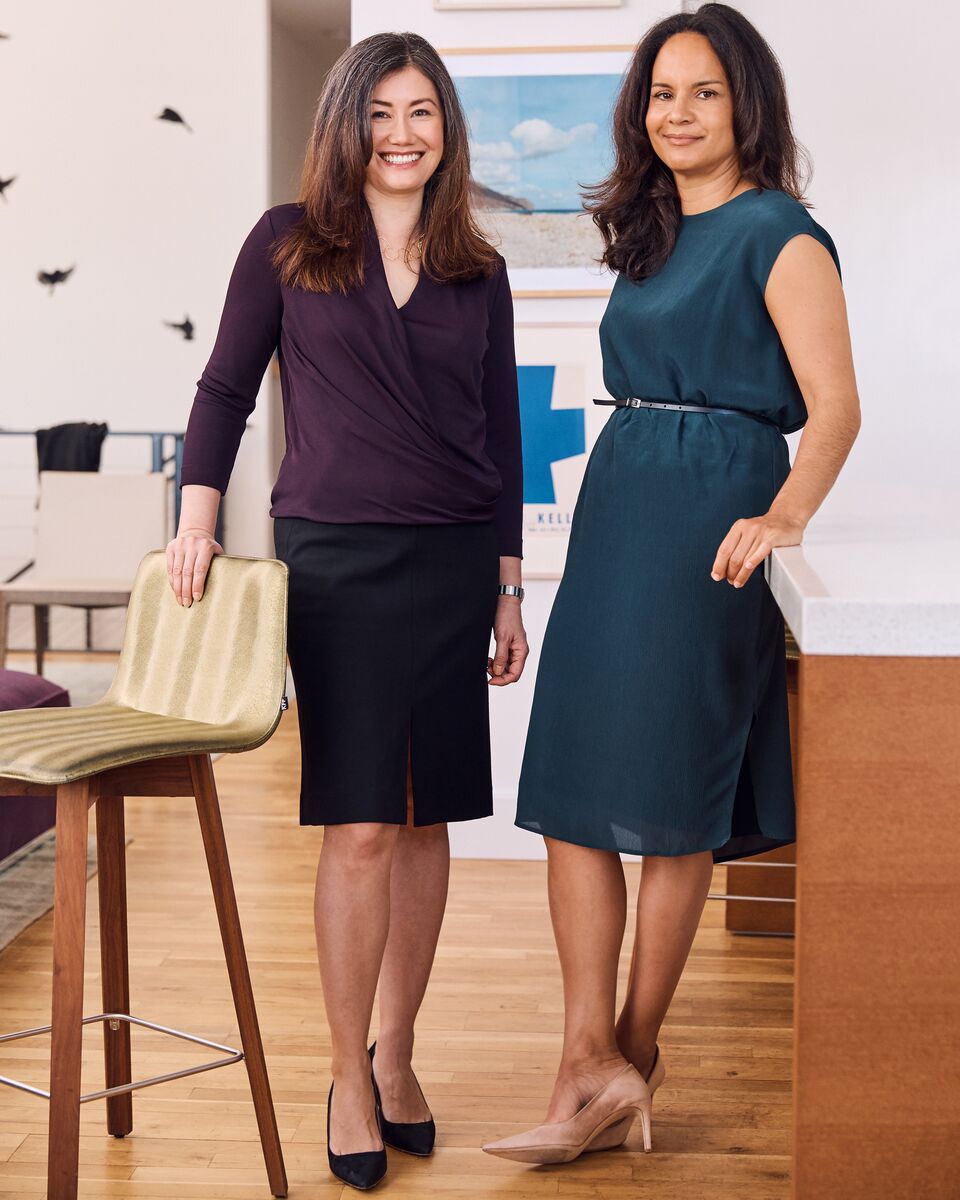
Stephanie (left) wears the Deneuve top in blackberry, the Greenpoint skirt in black, and the Helene necklace. Nina (right) wears the Doris dress in rainforest.
On What’s Next
Nina: I do feel like I’m starting a new phase right now. I just got divorced for the second time. My kids are mostly grown. What I’m hoping is that we turn this Woolfer thing into a real, viable brand that women can connect to in real life and online. It has made me feel ambitious in a way I haven’t since my twenties. In my thirties, I worried that I might never work seriously again, and this project made me want to do that. And if it doesn’t work out, something else will happen. For the next 10 or 15 years, I predict that I’ll have a lot of ambition when it comes to work. And I might remarry. I aspire to have a good marriage, and to have grandchildren. Those are my goals.
Stephanie: I wouldn’t say I feel 100 percent fearless, but once you’ve reinvented yourself a couple of times, you don’t stop. There’s some peace in knowing that you can handle change. I have a secret dream to become a mystery writer; maybe that’s next.
Nina: With each failure, if you get past it and you find something else to do, it becomes easier. When I got divorced the first time, I was so petrified that I’d be alone forever, and labeled a divorcée. The second time, the personal loss and disappointment are awful, but I don’t have the feeling that my life is over. I’ve got better things to do. In the end, I believe that both Stephanie and I are very capable. And if you have that capability at your core, you can really do anything.
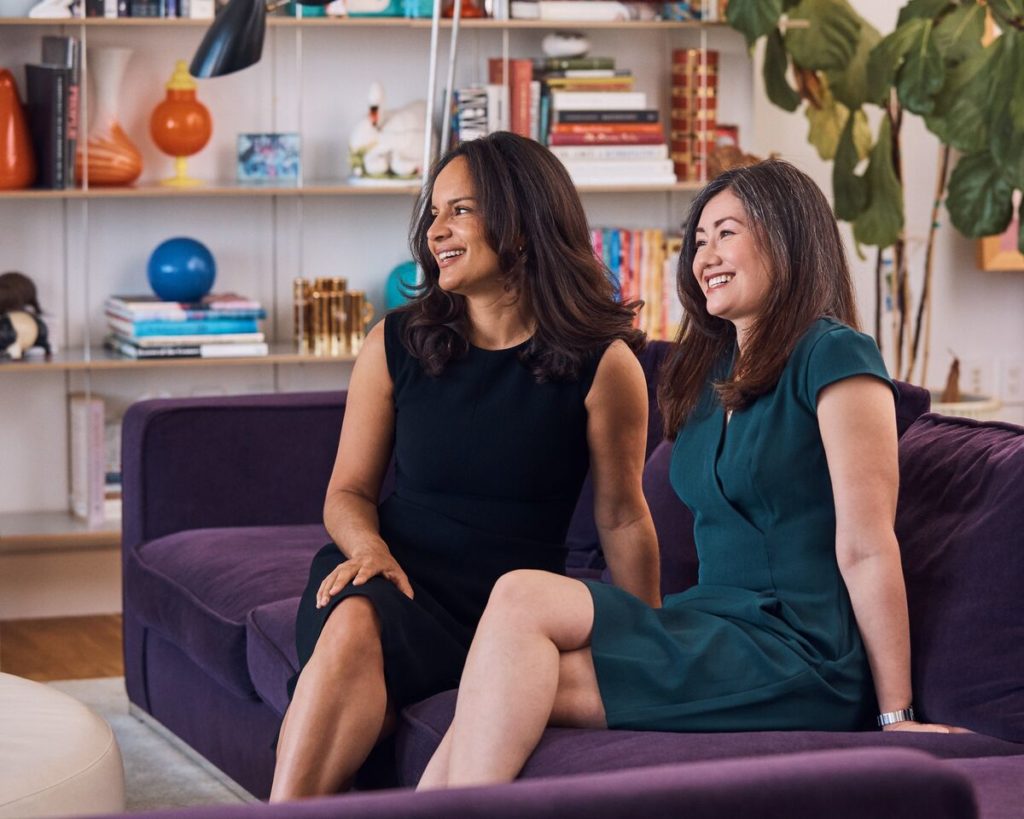
Nina (left) wears the Toi staccato dress in black. Stephanie (right) wears the Felisa dress in rainforest.
Photographs by Jeff Allen.





